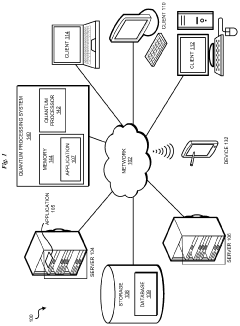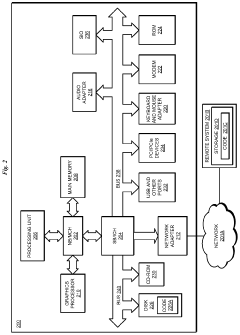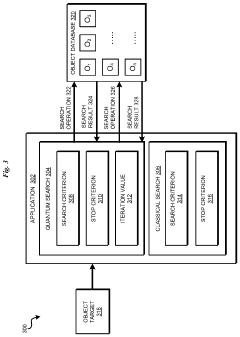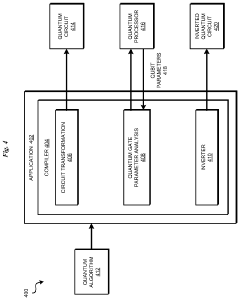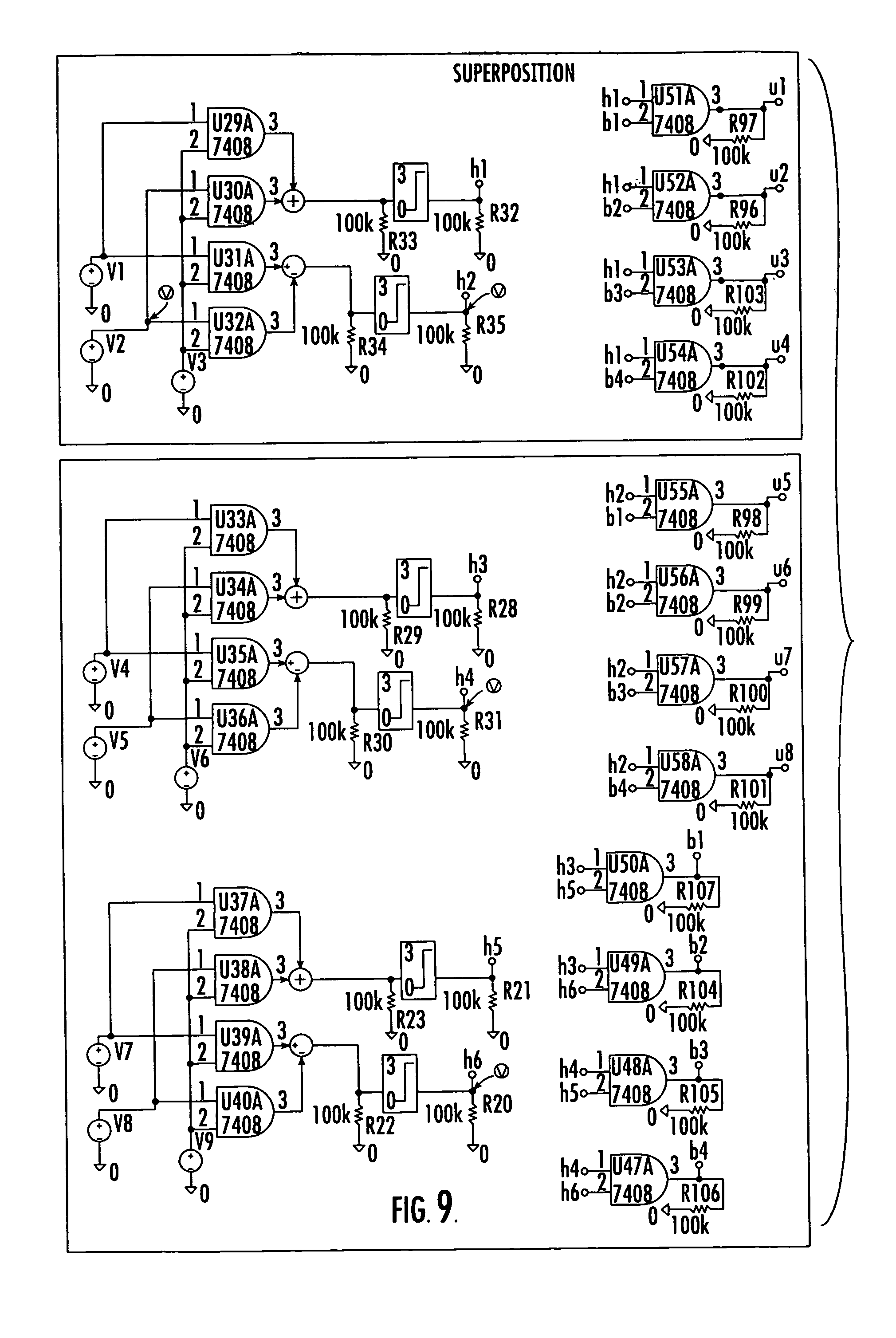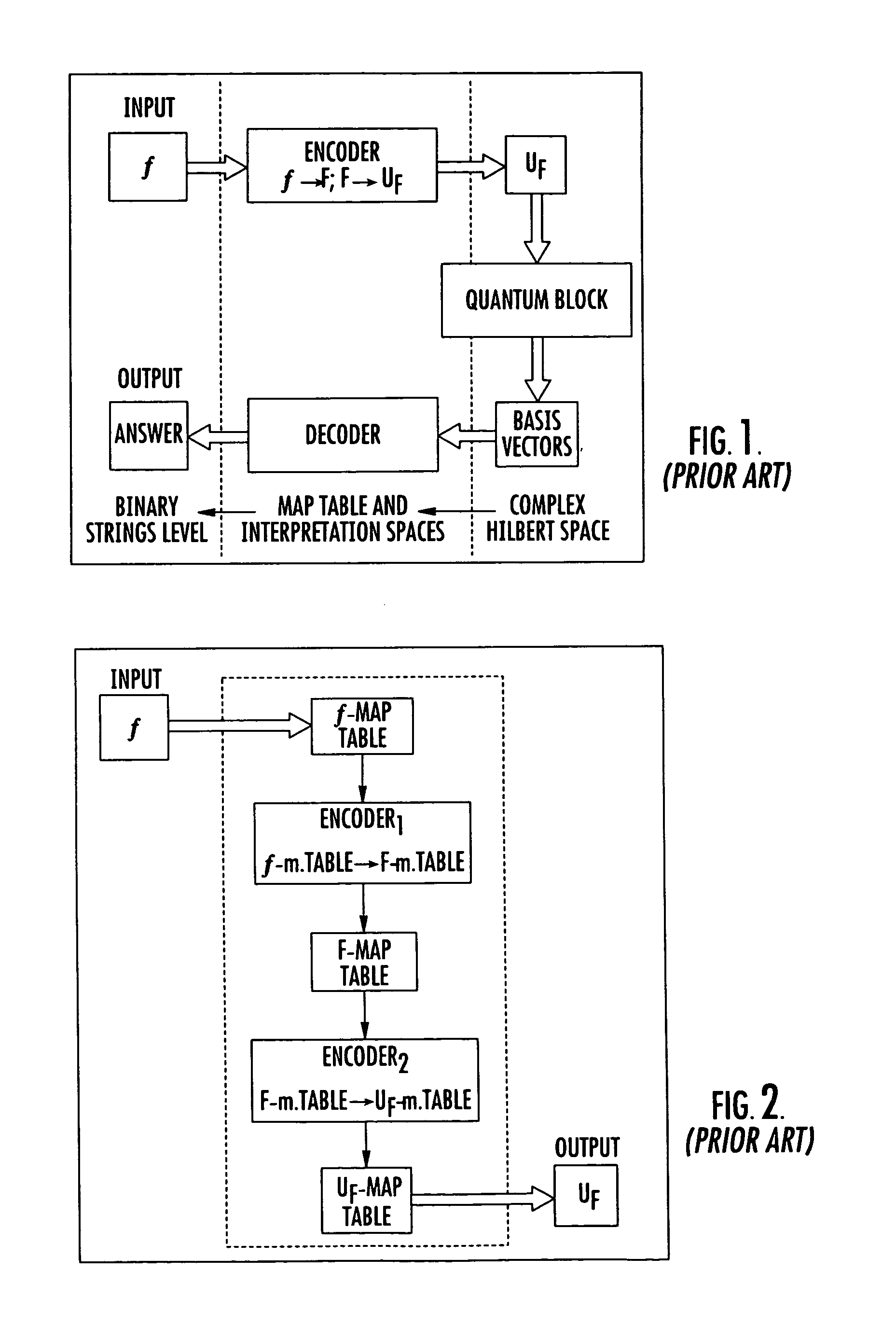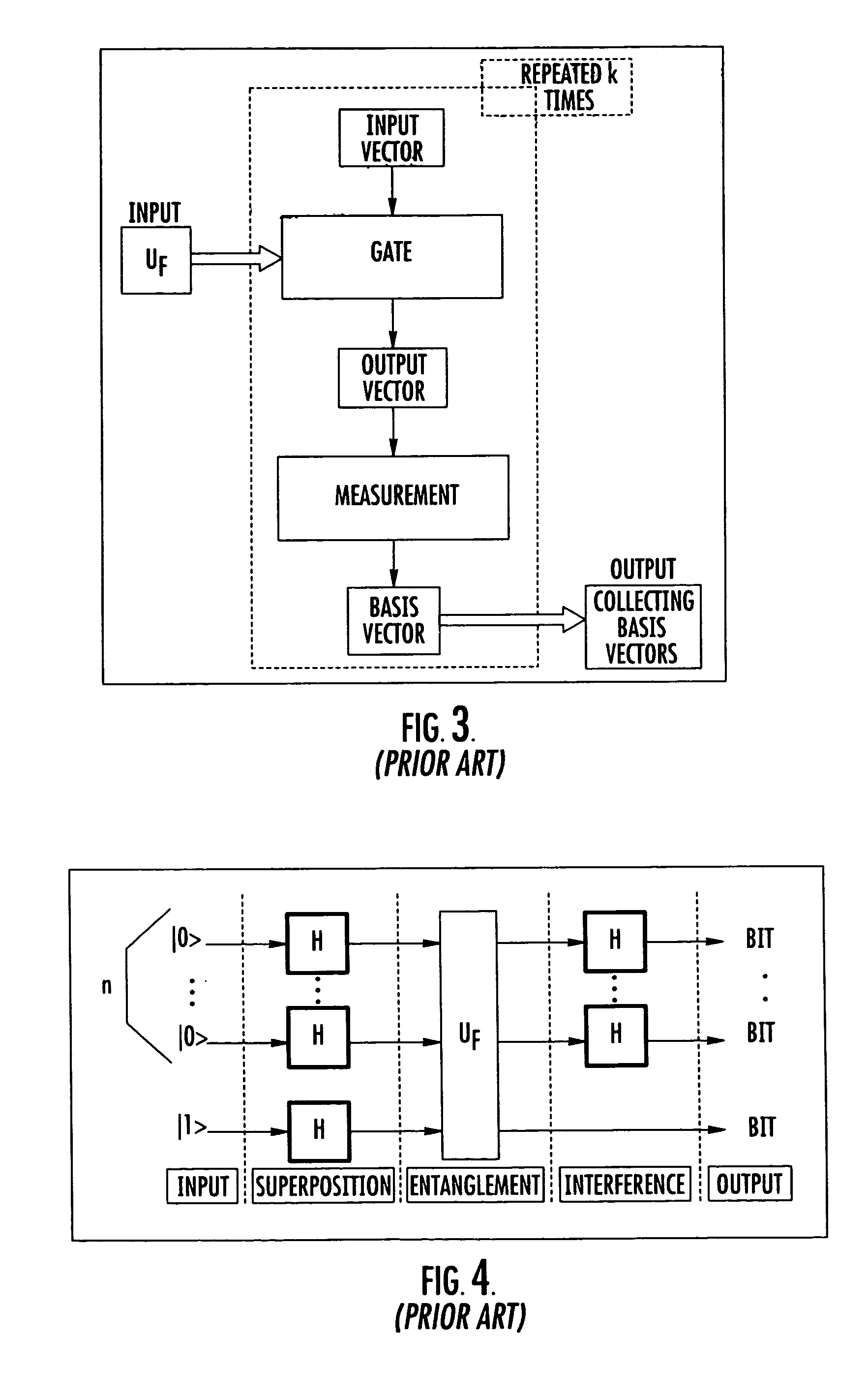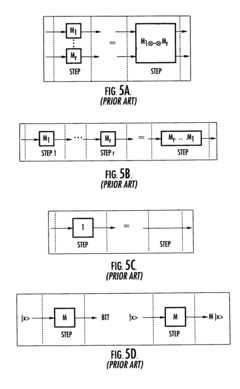Quantum Algorithms for Efficient Database Searching
JUL 17, 20259 MIN READ
Generate Your Research Report Instantly with AI Agent
Patsnap Eureka helps you evaluate technical feasibility & market potential.
Quantum Search Background
Quantum search algorithms represent a significant advancement in the field of database searching, offering the potential for exponential speedup compared to classical algorithms. The development of these algorithms is rooted in the principles of quantum mechanics, particularly superposition and entanglement, which allow quantum computers to perform certain computations more efficiently than their classical counterparts.
The concept of quantum search was first introduced by Lov Grover in 1996 with his groundbreaking Grover's algorithm. This algorithm demonstrated that a quantum computer could search an unsorted database of N items in approximately √N steps, a quadratic speedup over classical algorithms that require O(N) steps. This discovery sparked intense interest in the potential of quantum computing for database searching and optimization problems.
The quantum search paradigm relies on the ability of quantum systems to exist in multiple states simultaneously, a phenomenon known as superposition. In the context of database searching, this allows the algorithm to effectively "query" multiple database entries in parallel, significantly reducing the number of operations required to find a specific item.
Entanglement, another key quantum mechanical principle, plays a crucial role in quantum search algorithms by enabling the correlation of quantum bits (qubits) across the system. This property allows for the amplification of the desired search state, making it more likely to be measured when the quantum computation is concluded.
Since Grover's initial work, numerous variations and extensions of quantum search algorithms have been developed. These include amplitude amplification techniques, which generalize Grover's algorithm to a wider class of problems, and quantum walks, which provide a quantum analogue to classical random walk algorithms and have shown promise in certain search scenarios.
The potential applications of quantum search algorithms extend far beyond simple database queries. They have implications for cryptography, where they could potentially break certain encryption schemes, and for optimization problems in fields such as logistics, finance, and machine learning. However, it's important to note that the practical implementation of these algorithms on large-scale quantum computers remains a significant challenge.
As research in quantum computing continues to advance, the field of quantum search algorithms is evolving rapidly. Scientists and engineers are working to develop more robust and efficient quantum search techniques, as well as to identify new problem domains where quantum search may offer significant advantages over classical methods.
The concept of quantum search was first introduced by Lov Grover in 1996 with his groundbreaking Grover's algorithm. This algorithm demonstrated that a quantum computer could search an unsorted database of N items in approximately √N steps, a quadratic speedup over classical algorithms that require O(N) steps. This discovery sparked intense interest in the potential of quantum computing for database searching and optimization problems.
The quantum search paradigm relies on the ability of quantum systems to exist in multiple states simultaneously, a phenomenon known as superposition. In the context of database searching, this allows the algorithm to effectively "query" multiple database entries in parallel, significantly reducing the number of operations required to find a specific item.
Entanglement, another key quantum mechanical principle, plays a crucial role in quantum search algorithms by enabling the correlation of quantum bits (qubits) across the system. This property allows for the amplification of the desired search state, making it more likely to be measured when the quantum computation is concluded.
Since Grover's initial work, numerous variations and extensions of quantum search algorithms have been developed. These include amplitude amplification techniques, which generalize Grover's algorithm to a wider class of problems, and quantum walks, which provide a quantum analogue to classical random walk algorithms and have shown promise in certain search scenarios.
The potential applications of quantum search algorithms extend far beyond simple database queries. They have implications for cryptography, where they could potentially break certain encryption schemes, and for optimization problems in fields such as logistics, finance, and machine learning. However, it's important to note that the practical implementation of these algorithms on large-scale quantum computers remains a significant challenge.
As research in quantum computing continues to advance, the field of quantum search algorithms is evolving rapidly. Scientists and engineers are working to develop more robust and efficient quantum search techniques, as well as to identify new problem domains where quantum search may offer significant advantages over classical methods.
Market Demand Analysis
The market demand for quantum algorithms in database searching is experiencing significant growth, driven by the increasing volume of data and the need for more efficient search mechanisms. As traditional database searching methods struggle to keep pace with the exponential growth of data, quantum algorithms offer a promising solution to enhance search efficiency and speed.
In the financial sector, quantum algorithms for database searching are gaining traction. Major banks and investment firms are exploring these technologies to accelerate market analysis, risk assessment, and fraud detection. The ability to quickly search through vast financial datasets can provide a competitive edge in high-frequency trading and portfolio optimization.
Healthcare and pharmaceutical industries are also showing keen interest in quantum database searching algorithms. With the explosion of genomic data and electronic health records, there is a pressing need for faster and more accurate search capabilities. Quantum algorithms could potentially revolutionize drug discovery processes by enabling rapid searches through molecular databases, significantly reducing the time and cost of developing new treatments.
E-commerce and tech giants are investing heavily in quantum computing research, with a particular focus on database searching applications. These companies handle massive amounts of user data and product information, making efficient search capabilities crucial for personalized recommendations, targeted advertising, and inventory management.
Government agencies and research institutions are another significant market segment for quantum database searching algorithms. Applications range from national security and intelligence gathering to scientific research in fields such as astronomy and particle physics, where vast datasets need to be analyzed efficiently.
The telecommunications industry is exploring quantum algorithms to optimize network routing and improve search capabilities in large-scale communication databases. This could lead to more efficient network management and enhanced service quality for users.
While the market for quantum algorithms in database searching is still in its early stages, industry analysts project substantial growth in the coming years. The global quantum computing market, which includes database searching applications, is expected to expand rapidly as quantum hardware becomes more accessible and algorithms more sophisticated.
However, challenges remain in terms of hardware limitations and the need for error correction in quantum systems. Despite these hurdles, the potential benefits of quantum algorithms for database searching continue to drive investment and research across various sectors, indicating a robust and growing market demand for this transformative technology.
In the financial sector, quantum algorithms for database searching are gaining traction. Major banks and investment firms are exploring these technologies to accelerate market analysis, risk assessment, and fraud detection. The ability to quickly search through vast financial datasets can provide a competitive edge in high-frequency trading and portfolio optimization.
Healthcare and pharmaceutical industries are also showing keen interest in quantum database searching algorithms. With the explosion of genomic data and electronic health records, there is a pressing need for faster and more accurate search capabilities. Quantum algorithms could potentially revolutionize drug discovery processes by enabling rapid searches through molecular databases, significantly reducing the time and cost of developing new treatments.
E-commerce and tech giants are investing heavily in quantum computing research, with a particular focus on database searching applications. These companies handle massive amounts of user data and product information, making efficient search capabilities crucial for personalized recommendations, targeted advertising, and inventory management.
Government agencies and research institutions are another significant market segment for quantum database searching algorithms. Applications range from national security and intelligence gathering to scientific research in fields such as astronomy and particle physics, where vast datasets need to be analyzed efficiently.
The telecommunications industry is exploring quantum algorithms to optimize network routing and improve search capabilities in large-scale communication databases. This could lead to more efficient network management and enhanced service quality for users.
While the market for quantum algorithms in database searching is still in its early stages, industry analysts project substantial growth in the coming years. The global quantum computing market, which includes database searching applications, is expected to expand rapidly as quantum hardware becomes more accessible and algorithms more sophisticated.
However, challenges remain in terms of hardware limitations and the need for error correction in quantum systems. Despite these hurdles, the potential benefits of quantum algorithms for database searching continue to drive investment and research across various sectors, indicating a robust and growing market demand for this transformative technology.
Current Challenges
Quantum algorithms for efficient database searching face several significant challenges that hinder their widespread adoption and practical implementation. One of the primary obstacles is the current limitations of quantum hardware. Despite rapid advancements in quantum computing technology, the number of qubits and their coherence times remain insufficient for executing complex quantum search algorithms on large-scale databases.
The scalability of quantum search algorithms presents another major challenge. While theoretical models demonstrate the potential for quadratic speedup over classical algorithms, scaling these approaches to real-world database sizes proves problematic. As the database size increases, maintaining quantum coherence and managing error rates becomes increasingly difficult, potentially negating the advantages of quantum search.
Error correction and fault tolerance are critical issues in quantum computing, particularly for search algorithms that require precise quantum state manipulation. Current quantum error correction techniques consume a significant portion of available qubits, reducing the effective computational capacity for the search algorithm itself. Developing more efficient error correction methods is essential for realizing the full potential of quantum search algorithms.
The interface between classical and quantum systems poses another challenge. Efficient data loading from classical databases into quantum states, as well as the extraction and interpretation of quantum search results, require sophisticated quantum-classical hybrid approaches. Optimizing this interface is crucial for achieving practical quantum speedup in real-world database search scenarios.
Algorithm design and optimization for specific database structures and search problems remain active areas of research. While Grover's algorithm provides a general framework for quantum search, tailoring quantum algorithms to specific database architectures and query types is necessary to maximize performance gains. This requires a deep understanding of both quantum mechanics and database theory.
The lack of standardized benchmarks and performance metrics for quantum search algorithms complicates the assessment of their practical advantages over classical methods. Developing comprehensive benchmarking frameworks that account for various database sizes, structures, and query complexities is essential for guiding future research and development efforts.
Lastly, the integration of quantum search algorithms into existing database management systems and software infrastructure presents significant technical and logistical challenges. Bridging the gap between theoretical quantum algorithms and practical software implementations requires substantial interdisciplinary collaboration and investment in quantum-aware software development tools and frameworks.
The scalability of quantum search algorithms presents another major challenge. While theoretical models demonstrate the potential for quadratic speedup over classical algorithms, scaling these approaches to real-world database sizes proves problematic. As the database size increases, maintaining quantum coherence and managing error rates becomes increasingly difficult, potentially negating the advantages of quantum search.
Error correction and fault tolerance are critical issues in quantum computing, particularly for search algorithms that require precise quantum state manipulation. Current quantum error correction techniques consume a significant portion of available qubits, reducing the effective computational capacity for the search algorithm itself. Developing more efficient error correction methods is essential for realizing the full potential of quantum search algorithms.
The interface between classical and quantum systems poses another challenge. Efficient data loading from classical databases into quantum states, as well as the extraction and interpretation of quantum search results, require sophisticated quantum-classical hybrid approaches. Optimizing this interface is crucial for achieving practical quantum speedup in real-world database search scenarios.
Algorithm design and optimization for specific database structures and search problems remain active areas of research. While Grover's algorithm provides a general framework for quantum search, tailoring quantum algorithms to specific database architectures and query types is necessary to maximize performance gains. This requires a deep understanding of both quantum mechanics and database theory.
The lack of standardized benchmarks and performance metrics for quantum search algorithms complicates the assessment of their practical advantages over classical methods. Developing comprehensive benchmarking frameworks that account for various database sizes, structures, and query complexities is essential for guiding future research and development efforts.
Lastly, the integration of quantum search algorithms into existing database management systems and software infrastructure presents significant technical and logistical challenges. Bridging the gap between theoretical quantum algorithms and practical software implementations requires substantial interdisciplinary collaboration and investment in quantum-aware software development tools and frameworks.
Existing Quantum Search
01 Quantum circuit optimization
Techniques for optimizing quantum circuits to improve algorithm efficiency. This includes methods for reducing gate count, minimizing circuit depth, and optimizing qubit allocation. These optimizations can significantly enhance the performance of quantum algorithms on current and near-term quantum hardware.- Quantum circuit optimization: Techniques for optimizing quantum circuits to improve algorithm efficiency. This includes methods for reducing gate count, minimizing circuit depth, and optimizing qubit allocation. These optimizations can significantly enhance the performance of quantum algorithms on real quantum hardware.
- Hybrid quantum-classical algorithms: Development of algorithms that combine quantum and classical computing techniques to leverage the strengths of both paradigms. These hybrid approaches can improve overall efficiency by using classical computers for certain tasks and quantum processors for others, potentially leading to better performance in practical applications.
- Error mitigation and noise reduction: Strategies for mitigating errors and reducing noise in quantum systems to enhance algorithm efficiency. This includes techniques such as error correction codes, dynamical decoupling, and noise-aware circuit compilation, which can improve the reliability and performance of quantum algorithms on noisy intermediate-scale quantum (NISQ) devices.
- Quantum algorithm benchmarking and performance analysis: Methods for evaluating and comparing the efficiency of different quantum algorithms. This includes developing standardized benchmarks, performance metrics, and analysis tools to assess algorithm speed, resource requirements, and scalability across various quantum computing platforms.
- Quantum-inspired classical algorithms: Development of classical algorithms inspired by quantum computing principles to improve efficiency in solving certain problems. These algorithms aim to capture some of the advantages of quantum computation while running on classical hardware, potentially offering speedups for specific tasks without requiring a quantum computer.
02 Hybrid quantum-classical algorithms
Development of algorithms that combine quantum and classical computing resources to achieve better efficiency. These hybrid approaches leverage the strengths of both quantum and classical systems, allowing for improved performance in various applications such as optimization, machine learning, and simulation.Expand Specific Solutions03 Error mitigation techniques
Implementation of error mitigation strategies to improve the reliability and efficiency of quantum algorithms. These techniques aim to reduce the impact of noise and decoherence on quantum computations, enabling more accurate results and potentially extending the capabilities of near-term quantum devices.Expand Specific Solutions04 Quantum algorithm benchmarking
Development of standardized benchmarks and metrics for assessing the efficiency of quantum algorithms. These tools enable researchers and developers to compare different quantum algorithms and hardware implementations, facilitating the identification of the most efficient approaches for specific problems.Expand Specific Solutions05 Quantum-inspired classical algorithms
Creation of classical algorithms inspired by quantum computing principles to improve efficiency in solving certain problems. These algorithms aim to capture some of the advantages of quantum computation while running on classical hardware, potentially offering speedups for specific tasks without requiring quantum devices.Expand Specific Solutions
Key Industry Players
The quantum algorithms for efficient database searching field is in an early development stage, with significant potential for growth. The market size is expanding as quantum computing advances, though still relatively small compared to classical database technologies. Technical maturity is progressing, with companies like IBM, Origin Quantum, and Tencent leading research efforts. IBM's extensive quantum computing experience positions them as a frontrunner, while Origin Quantum's specialized focus and Tencent's resources drive innovation. Universities like Shenzhen University and Nanjing University of Posts & Telecommunications contribute valuable academic research, fostering a competitive landscape balancing corporate and academic players.
Origin Quantum Computing Technology (Hefei) Co., Ltd.
Technical Solution: Origin Quantum is a Chinese company focused on developing quantum computing hardware and software. For database searching, they are working on implementing and optimizing quantum search algorithms on their superconducting quantum processors. Their approach includes developing quantum error correction techniques to improve the reliability of quantum search operations[7]. Origin Quantum is also exploring quantum machine learning algorithms that can enhance database search capabilities by learning patterns and structures within the data. They are collaborating with academic institutions to develop novel quantum algorithms that could potentially outperform Grover's algorithm for specific types of database searches[8].
Strengths: Strong government support, rapidly advancing quantum hardware capabilities. Weaknesses: Limited international presence, potential challenges in accessing global markets and collaborations.
International Business Machines Corp.
Technical Solution: IBM has developed a quantum algorithm called Grover's algorithm, specifically designed for efficient database searching. This algorithm provides a quadratic speedup over classical algorithms, reducing the search time from O(N) to O(√N) for a database of N items[1]. IBM's quantum computers, such as the IBM Q System One, utilize superconducting qubits and quantum gates to implement this algorithm. They have also developed a quantum software development kit, Qiskit, which allows researchers to implement and test quantum algorithms for database searching on both simulators and real quantum hardware[2]. IBM's approach combines hardware and software solutions to address the challenges of quantum database searching.
Strengths: Industry-leading quantum hardware and software ecosystem, extensive research experience. Weaknesses: Quantum computers still limited in qubit count and coherence time, practical applications remain challenging.
Core Quantum Innovations
Automatic quantum searching of object databases
PatentActiveUS11874838B2
Innovation
- A method that uses a combination of classical and quantum processors to measure amplitudes in a quantum circuit, performing amplitude amplifications and verification operations to locate a target object in an object database, with the number of amplifications adjusted based on the database size, allowing for automatic quantum searching without prior knowledge of the database size.
Method of performing the superposition operation of a Grover's or a Deutsch-Jozsa's quantum algorithm and a relative quantum gate
PatentInactiveUS7069282B2
Innovation
- A quantum gate is designed using logic gates to perform Hadamard rotations and tensor products, encoding components as logic values to facilitate fast multiplications and superposition operations, reducing the computational burden by using a modular architecture of AND gates and adders for efficient vector processing.
Quantum Hardware Impact
The impact of quantum hardware on database searching algorithms is a critical factor in determining the practical applicability and performance of quantum-based search techniques. As quantum computing technology continues to advance, the capabilities of quantum hardware directly influence the efficiency and scalability of quantum algorithms for database searching.
Current quantum hardware implementations, such as superconducting qubits and trapped ions, have demonstrated the ability to perform basic quantum operations required for database searching algorithms. However, these systems are still limited in terms of qubit count, coherence times, and error rates. These limitations pose challenges for implementing large-scale quantum search algorithms on real-world databases.
Despite these challenges, recent advancements in quantum hardware have shown promising results for database searching applications. Improvements in qubit quality, gate fidelity, and error correction techniques have enabled researchers to demonstrate small-scale implementations of quantum search algorithms on actual quantum processors. These demonstrations serve as proof-of-concept for the potential of quantum-enhanced database searching.
The development of quantum hardware specifically optimized for database searching algorithms is an emerging area of research. Quantum annealing processors, for instance, have shown potential for certain types of search and optimization problems. These specialized quantum hardware architectures may offer advantages in terms of scalability and robustness for specific database searching tasks.
As quantum hardware continues to evolve, it is expected to have a significant impact on the performance and practicality of quantum algorithms for database searching. Increased qubit counts and improved coherence times will allow for larger database sizes to be searched efficiently. Enhanced error correction techniques and fault-tolerant quantum computing architectures will enable more complex quantum search algorithms to be implemented reliably.
The integration of quantum hardware with classical computing systems is another important aspect to consider. Hybrid quantum-classical approaches for database searching are being explored, where quantum processors are used to accelerate specific parts of the search process while leveraging classical hardware for other tasks. This hybrid approach may provide a more practical path towards realizing the benefits of quantum search algorithms in real-world database applications.
In conclusion, the ongoing development of quantum hardware plays a crucial role in shaping the future of quantum algorithms for efficient database searching. As quantum hardware capabilities continue to improve, we can expect to see more powerful and practical implementations of quantum search algorithms, potentially revolutionizing the field of database management and information retrieval.
Current quantum hardware implementations, such as superconducting qubits and trapped ions, have demonstrated the ability to perform basic quantum operations required for database searching algorithms. However, these systems are still limited in terms of qubit count, coherence times, and error rates. These limitations pose challenges for implementing large-scale quantum search algorithms on real-world databases.
Despite these challenges, recent advancements in quantum hardware have shown promising results for database searching applications. Improvements in qubit quality, gate fidelity, and error correction techniques have enabled researchers to demonstrate small-scale implementations of quantum search algorithms on actual quantum processors. These demonstrations serve as proof-of-concept for the potential of quantum-enhanced database searching.
The development of quantum hardware specifically optimized for database searching algorithms is an emerging area of research. Quantum annealing processors, for instance, have shown potential for certain types of search and optimization problems. These specialized quantum hardware architectures may offer advantages in terms of scalability and robustness for specific database searching tasks.
As quantum hardware continues to evolve, it is expected to have a significant impact on the performance and practicality of quantum algorithms for database searching. Increased qubit counts and improved coherence times will allow for larger database sizes to be searched efficiently. Enhanced error correction techniques and fault-tolerant quantum computing architectures will enable more complex quantum search algorithms to be implemented reliably.
The integration of quantum hardware with classical computing systems is another important aspect to consider. Hybrid quantum-classical approaches for database searching are being explored, where quantum processors are used to accelerate specific parts of the search process while leveraging classical hardware for other tasks. This hybrid approach may provide a more practical path towards realizing the benefits of quantum search algorithms in real-world database applications.
In conclusion, the ongoing development of quantum hardware plays a crucial role in shaping the future of quantum algorithms for efficient database searching. As quantum hardware capabilities continue to improve, we can expect to see more powerful and practical implementations of quantum search algorithms, potentially revolutionizing the field of database management and information retrieval.
Quantum Security Aspects
Quantum algorithms for efficient database searching have significant implications for quantum security aspects. As these algorithms advance, they pose both opportunities and challenges for cybersecurity. One of the primary concerns is the potential threat to current encryption methods. Quantum search algorithms, such as Grover's algorithm, could theoretically break certain cryptographic systems by significantly reducing the time required to search through large key spaces.
However, this same capability also presents opportunities for enhancing security measures. Quantum search algorithms could be employed to strengthen cryptographic protocols, enabling more robust key generation and verification processes. They could also be utilized in intrusion detection systems, allowing for faster and more efficient identification of potential security breaches in large datasets.
The impact of quantum search algorithms on database security is another critical aspect to consider. While these algorithms could potentially compromise the confidentiality of sensitive information stored in databases, they also offer new methods for securing data. Quantum-resistant database structures and encryption techniques are being developed to mitigate the risks posed by quantum search capabilities.
In the realm of network security, quantum search algorithms could revolutionize the way we detect and prevent cyber attacks. By enabling rapid analysis of network traffic patterns and anomalies, these algorithms could significantly enhance the speed and accuracy of threat detection systems. This could lead to more proactive and effective cybersecurity measures, particularly in large-scale network environments.
The integration of quantum search algorithms with other quantum technologies, such as quantum key distribution (QKD), is an area of active research. This combination could result in highly secure communication systems that are resistant to both classical and quantum attacks. Such advancements could reshape the landscape of secure data transmission and storage.
As quantum computing continues to evolve, it is crucial to develop quantum-safe cryptographic standards and protocols. This includes the creation of post-quantum cryptography algorithms that can withstand attacks from both classical and quantum computers. The National Institute of Standards and Technology (NIST) is currently leading efforts to standardize post-quantum cryptographic algorithms, which will be essential for maintaining long-term data security in the quantum era.
However, this same capability also presents opportunities for enhancing security measures. Quantum search algorithms could be employed to strengthen cryptographic protocols, enabling more robust key generation and verification processes. They could also be utilized in intrusion detection systems, allowing for faster and more efficient identification of potential security breaches in large datasets.
The impact of quantum search algorithms on database security is another critical aspect to consider. While these algorithms could potentially compromise the confidentiality of sensitive information stored in databases, they also offer new methods for securing data. Quantum-resistant database structures and encryption techniques are being developed to mitigate the risks posed by quantum search capabilities.
In the realm of network security, quantum search algorithms could revolutionize the way we detect and prevent cyber attacks. By enabling rapid analysis of network traffic patterns and anomalies, these algorithms could significantly enhance the speed and accuracy of threat detection systems. This could lead to more proactive and effective cybersecurity measures, particularly in large-scale network environments.
The integration of quantum search algorithms with other quantum technologies, such as quantum key distribution (QKD), is an area of active research. This combination could result in highly secure communication systems that are resistant to both classical and quantum attacks. Such advancements could reshape the landscape of secure data transmission and storage.
As quantum computing continues to evolve, it is crucial to develop quantum-safe cryptographic standards and protocols. This includes the creation of post-quantum cryptography algorithms that can withstand attacks from both classical and quantum computers. The National Institute of Standards and Technology (NIST) is currently leading efforts to standardize post-quantum cryptographic algorithms, which will be essential for maintaining long-term data security in the quantum era.
Unlock deeper insights with Patsnap Eureka Quick Research — get a full tech report to explore trends and direct your research. Try now!
Generate Your Research Report Instantly with AI Agent
Supercharge your innovation with Patsnap Eureka AI Agent Platform!
